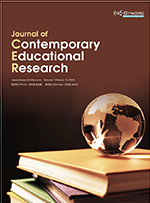Abstract
This paper discusses the transformation of art education in anticipation of the future school, and emphasizes the key role of art education in cultivating students’ creativity, aesthetic ability, thinking ability, and meeting social needs. The shortcomings and delays in the traditional art education mode have become evident, prompting the need to explore innovative educational methods. Digital art education is emerging as a means to offer a more immersive art experience through virtual and augmented reality technologies while broadening students’ cultural horizons. Interdisciplinary integration combines art with science, engineering, mathematics, and other disciplines to cultivate students’ comprehensive literacy and innovative thinking. The innovative spirit and the application of educational technology help students overcome difficulties and continuously improve their work. The article also emphasizes the alignment between art education and social needs, the importance of social support and resources, and the training and development of teachers.
References
Guan X, 2022, Teaching and Practice Exploration of the “Modern Media Art” Module in High School Fine Arts from the Perspective of Visual Culture, Master’s thesis, Wenzhou University.
Wen Z, Li Y, 2020, Research on Establishing a Student Evaluation System for High School Art Performance Literacy through Information Technology. Secondary School Curriculum Coaching (Teaching Research), 2020(36): 87.
Chen M, Chen Z, 2019, A-STEM: The Value Reconstruction of Interdisciplinary Integration in Education. Research in Educational Development, 2019(06): 15–22. http://doi.org/10.14121/j.cnki.1008-3855.2019.06.005
Li Y, 2022, On the Integration of Art Appreciation and Chinese Subject in the Teaching of Graphic Isomorphism. New Horizon, 2022(12): 130–132.
Shi J, Li Y, 2021, On the Integration of High School Art Performance Education and “Four Confidences” in the Information Technology Environment. Panorama of Chinese Nationalities, 2021(16): 75–77.
Zhou Y, 2023, Guided by the Concept of Core Competencies for the Future Construction of Compulsory Education Schools. School Education, 2023(26): 4–6.
Qian C, 2020, The Innovative Development of School Art Education from the Perspective of Aesthetic Education. Art Research, 2020(03): 11–14. http://doi.org/10.13318/j.cnki.msyj.2020.03.003
Qin MA, 2023, The Integration of Modern Information Technology and High School Art Appreciation Teaching. Academy, 2023(33): 40–42.
Luo B, Li Y, 2021, Research on Strategies and Means to Promote the Cultivation of Artistic Expression Literacy Among High School Students Through Information Technology. Popular Literature and Art, 2021(06): 181–183.
Munna AS, Kalam MA, 2021, Teaching and Learning Process to Enhance Teaching Effectiveness: A Literature Review. International Journal of Humanities and Innovation (IJHI), 4(1): 1–4.
Chen C, 2017, Research on the Implementation of Comprehensive Quality Evaluation for High School Students, Doctoral dissertation, Henan University.
Chen J, 2023, Research on Teacher’s Teaching Literacy, Master’s thesis, Zhejiang Normal University.
Li J, 2017, Research on the Current Function of General High School Education in China, Doctoral dissertation, Liaoning Normal University.
Li Y, Luo L, Xiang Y, et al., 2021, Promoting the Reform of Art Education in the High School Art Teaching and Research Communication Community Under the Information Technology Environment. Data of Culture and Education, 2021(06): 230–232.
Chen L, Wang Q, Gao P, et al., 2019, The Power of Educational Change. Chongqing University Press, 2019(11): 243.
